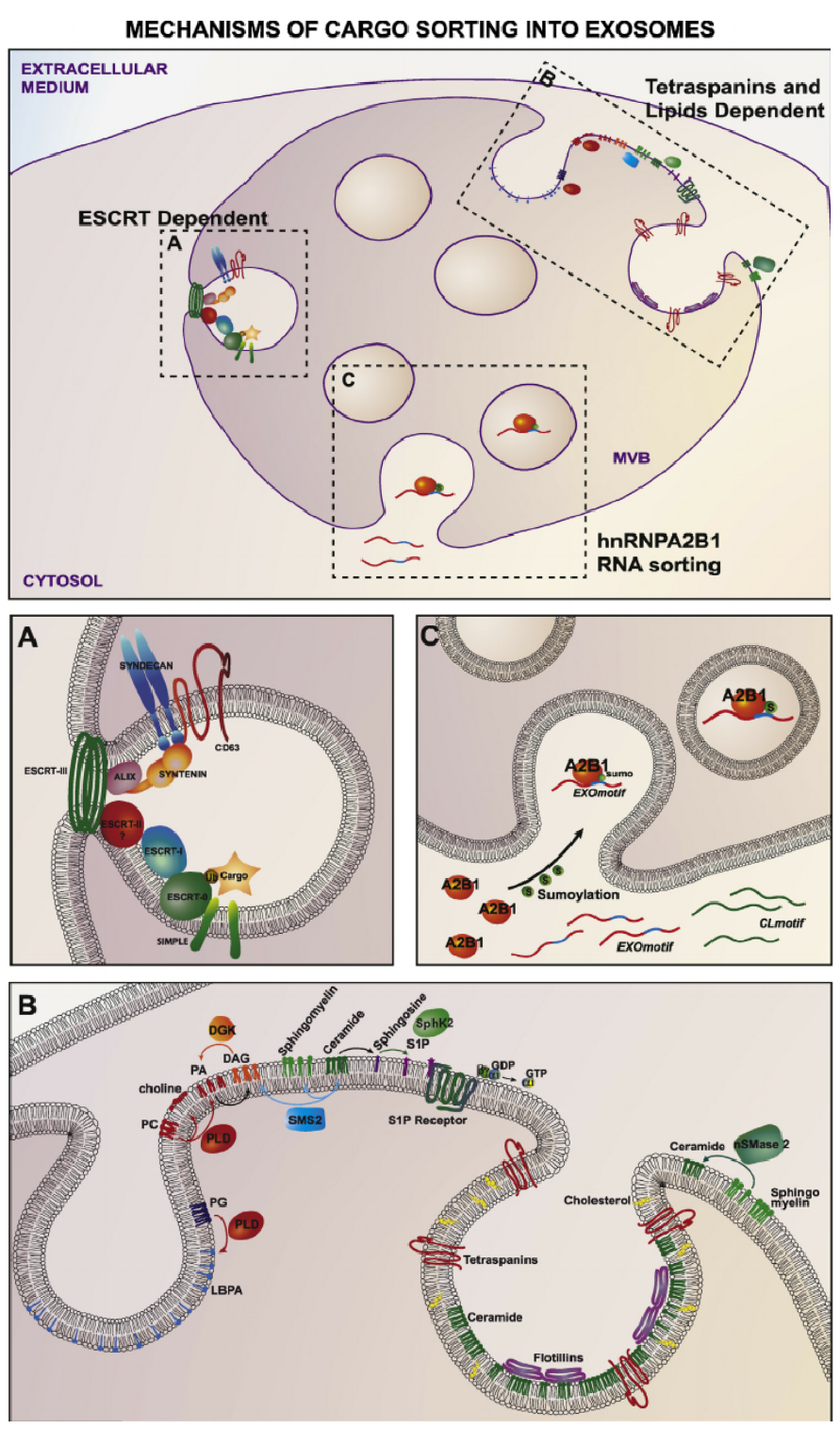Exosomal Cargo and Loading Mechanism Service
- Isolated Exosomes: ≥200 μg total protein or ≥100 μL in PBS
- Plasma/Serum: ≥2 mL per sample
- Cell Culture Supernatants: ≥5 mL per sample
- Other Body Fluids: Please inquire for specific requirements
Exosomes are nano-sized extracellular vesicles that mediate intercellular communication and have emerged as promising tools for diagnostics, therapeutics, and drug delivery. Investigating their cargo composition and loading mechanisms is critical for understanding exosome biology and for engineering functionalized vesicles for research or clinical applications. MtoZ Biolabs offers a comprehensive Exosomal Cargo and Loading Mechanism Service that is designed to help researchers elucidate the nature of exosomal cargo and uncover the molecular pathways governing their selective packaging.
Exosomal Cargo Types and Loading Mechanisms
Exosomes carry a highly regulated cargo repertoire, including proteins, RNAs, lipids, and metabolites. This cargo is not randomly incorporated but is selectively sorted through precise molecular mechanisms during exosome biogenesis.
1. Protein Cargo
Exosomal proteins include tetraspanins (CD9, CD63, CD81), ESCRT-related components (TSG101, Alix), heat shock proteins (HSP70, HSP90), and signaling molecules. Protein loading is mediated via:
💠ESCRT-dependent sorting: Involves ESCRT-0 to ESCRT-III complexes that recognize ubiquitinated proteins and facilitate their inclusion into intraluminal vesicles.
💠ESCRT-independent mechanisms: Enriched in lipid raft-associated and tetraspanin-enriched microdomains, aiding cargo clustering and vesicle budding.
💠Adaptor proteins and post-translational modifications: Specific motifs or PTMs (e.g., ubiquitination, sumoylation) direct proteins into exosomal compartments.
2. RNA Cargo
Exosomes are enriched with various RNA species, including mRNAs, miRNAs, lncRNAs, circRNAs, and tRNA fragments. RNA loading is governed by:
💠RNA-binding proteins (RBPs): Proteins such as hnRNPA2B1 recognize specific sequence motifs (EXOmotifs, hEXO motifs) to mediate RNA sorting.
💠Sequence- and structure-specific motifs: Certain 3′-UTR structures and nucleotide motifs promote preferential incorporation into exosomes.
💠Cell stress and metabolic states: Alter cellular conditions affect the spectrum of loaded RNAs via regulation of RBP expression or vesicle biogenesis dynamics.
3. Lipid Cargo
Exosomal membranes are rich in sphingomyelin, ceramides, cholesterol, and phosphatidylserine. Lipids serve dual roles as cargo and regulators of vesicle formation:
💠Ceramide-dependent budding: nSMase2-mediated ceramide generation induces negative membrane curvature, promoting vesicle budding and influencing lipid cargo inclusion.
💠Lipid raft microdomains: Facilitate co-packaging of lipids and proteins, influencing exosome stability and targeting.
💠Enzymatic regulation: Lipid-metabolizing enzymes determine the lipid species present within exosomes.

Figure 1. Mechanisms that Control the Sorting of Cargo into Exosomes
Service at MtoZ Biolabs
By dissecting these endogenous loading pathways, researchers can identify disease biomarkers, unravel pathophysiological mechanisms, and design exosomes for targeted delivery of therapeutic payloads. MtoZ Biolabs enables these investigations through high-resolution multi-omics technologies, including proteomics, transcriptomics, lipidomics, and metabolomics, powered by high-resolution mass spectrometry, next-generation sequencing and integrated with advanced bioinformatics analysis. Our comprehensive service platform supports detailed cargo profiling, mechanism elucidation, and functional validation to accelerate exosome-based research and therapeutic innovation.
Service Advantages
1. Comprehensive Multi-Omics Analysis
Simultaneous profiling of exosomal proteins, RNAs, lipids, and metabolites enables a holistic view of cargo composition.
2. Advanced Analytical Platforms
Integration of high-resolution mass spectrometry and next-generation sequencing ensures comprehensive exosomal cargo profiling with high accuracy, sensitivity, and reproducibility.
3. Customizable Experimental Design
Flexible workflows tailored to sample type, research question, and biological system.
4. Expert Data Interpretation
In-house bioinformatics team provides integrated, biologically meaningful analysis to support publication and downstream applications.
Applications
1️⃣Disease Mechanism Investigation: Profiling exosomal cargo and understanding loading mechanisms help elucidate cellular responses in cancer, neurodegenerative diseases, cardiovascular disorders, and infectious diseases.
2️⃣Biomarker Discovery: Identifying selectively loaded proteins, RNAs, or lipids in exosomes from disease samples supports the discovery of diagnostic, prognostic, and predictive biomarkers.
3️⃣Therapeutic Development: Insights into cargo loading mechanism enable the engineering of exosomes for targeted drug delivery, RNA-based therapeutics, and personalized medicine strategies.
4️⃣Drug Response and Resistance Studies: Monitoring how exosomal cargo changes under drug treatment can reveal resistance mechanisms or pharmacodynamic markers.
5️⃣Intercellular Communication Research: Studying the selective enrichment of signaling molecules within exosomes enhances understanding of their role in immune modulation, tumor microenvironment remodeling, and developmental biology.
Sample Submission Suggestions
We accept the following sample types:
Samples should be stored at -80°C and shipped on dry ice. Avoid repeated freeze–thaw cycles. Please consult us for tailored collection and storage protocols to maximize data quality.
Deliverables
1. Comprehensive experimental details (materials, instruments, and methods)
2. Multi-omics raw data
3. Bioinformatics Analysis
4. Cargo profiling tables (proteins, RNAs, lipids, metabolites)
5. Mechanistic assay results
6. Customized report based on project requirements
Understanding exosomal cargo selection is key to unlocking both biological function and therapeutic potential. MtoZ Biolabs' Exosomal Cargo and Loading Mechanism Service offers deep mechanistic insights and precise cargo analysis, empowering your research and development efforts. Contact us today to discuss how we can tailor this service to your specific exosome-based projects or therapeutic designs.
Related Services
Exosome Isolation and Purification Service
Exosomes Metabolomics Services
How to order?







